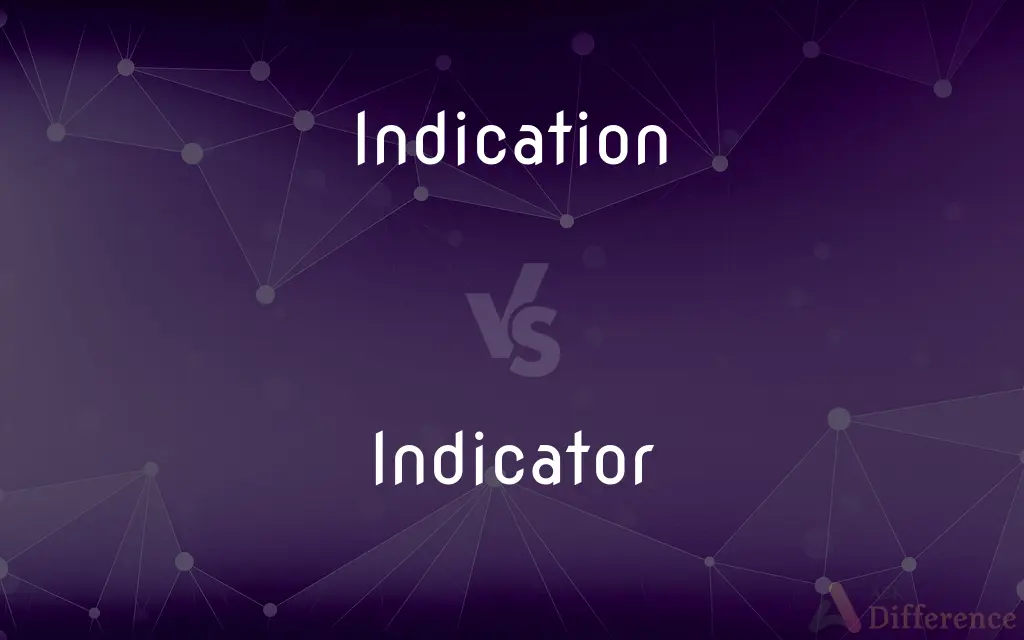Indication vs. Indicator — What's the Difference?
By Urooj Arif & Maham Liaqat — Updated on April 2, 2024
Indication is a sign or piece of information that suggests something, while an indicator is a specific measure or sign that shows the condition or level of something.

Difference Between Indication and Indicator
Table of Contents
ADVERTISEMENT
Key Differences
Indications are broader hints or clues that may not be quantifiable, suggesting the possibility or existence of a condition, situation, or trend. These can be symptoms in medicine, signs in everyday life, or pointers in research. On the other hand, indicators are often specific, measurable markers used to assess conditions, performance, or changes over time. They are used in various fields, from economics to environmental science, to track progress or deterioration.
Indications are more about suggestion and inference, often requiring interpretation within a context to deduce meaning or implications. For instance, smoke might indicate fire, or certain symptoms might indicate a disease. Whereas indicators are about clear, often quantitative measures that provide direct information, such as temperature readings indicating heat levels or economic data indicating financial health.
Indications can be subjective, relying on personal interpretation or experience to infer meaning. They might not always be directly measurable but are observed as signs or hints towards a conclusion. In contrast, indicators are objective and are often used in scientific, economic, and technical contexts where precise measurements are essential for decision-making or analysis.
While indications often require a broader understanding of context to interpret, indicators are designed to be straightforward and provide clear guidance. For instance, a low fuel light on a car dashboard is an indicator of the need to refuel, straightforward and universally understood, while an engine noise might be an indication of a problem requiring expert interpretation.
Indications and indicators, though different in their nature and use, often work together in practice. An indication might lead to the use of specific indicators for further investigation or confirmation, bridging the gap between initial inference and concrete evidence or measurement.
ADVERTISEMENT
Comparison Chart
Nature
Broad hint or clue
Specific measure or sign
Quantifiability
Often qualitative
Quantitative or qualitatively measurable
Interpretation
Requires context and interpretation
Direct and clear without needing much interpretation
Usage
Suggestive, indicating possibility
Measurable, showing specific conditions or levels
Fields
General use across various contexts
Often used in scientific, economic, technical areas
Compare with Definitions
Indication
A sign that something may exist or be true.
The presence of certain indicators in water is an indication of pollution.
Indicator
A device providing specific information or data, often as a measure.
The fuel gauge is an important indicator of how much fuel is left in the tank.
Indication
An act of pointing out or mentioning something.
His nod was an indication of approval.
Indicator
A sign that reveals the condition or functioning of a system.
High fever can be an indicator of severe infection.
Indication
A symptom that suggests certain medical treatment is necessary.
A fever is often an indication for the use of antipyretics.
Indicator
A signal for attracting attention or conveying information.
Turn signals are indicators of a vehicle's intended direction.
Indication
Something that serves to suggest or imply.
Her fatigue was an indication of her hard work.
Indicator
A chemical compound that changes color in the presence of certain conditions.
Litmus paper is an indicator used to test pH levels.
Indication
A hint or piece of information that helps to solve a problem or mystery.
The detective found an indication of the suspect's presence at the scene.
Indicator
A statistic or parameter that shows the state or level of something.
GDP growth is a key indicator of economic health.
Indication
The act of indicating
His indication of refusal came in the form of a frown.
Indicator
A thing that indicates the state or level of something
Car ownership is frequently used as an indicator of affluence
Indication
Something that serves to indicate; a sign
Indications of an economic recovery.
Indicator
A gauge or meter of a specified kind
An altitude indicator
A speed indicator
Indication
Something indicated as necessary or expedient
Bed rest is usually the indication for flu cases.
Indicator
A compound that changes colour at a specific pH value or in the presence of a particular substance, and can be used to monitor acidity, alkalinity, or the progress of a reaction
The remaining alkali is titrated against standard acid using phenolphthalein as indicator
Indication
The information indicated by a measuring instrument.
Indicator
A pointer or an index.
Indication
Act of pointing out or indicating.
Indicator
An instrument used to monitor the operation or condition of an engine, furnace, electrical network, reservoir, or other physical system; a meter or gauge.
Indication
That which serves to indicate or point out; mark; token; sign; symptom; evidence.
There's no indication that the fire was caused by criminals.
All the indications point to drink-driving as the cause of the accident.
Indicator
The needle, dial, or other registering device on such an instrument.
Indication
Discovery made; information.
Indicator
(Chemistry) Any of various substances, such as litmus or phenolphthalein, that indicate the presence, absence, or concentration of another substance or the degree of reaction between two or more substances by means of a characteristic change, especially in color.
Indication
(obsolete) Explanation; display.
Indicator
(Ecology) An indicator species.
Indication
(medicine) Any symptom or occurrence in a disease, which serves to direct to suitable remedies.
Indicator
Any of various statistical values that together provide an indication of the condition or direction of the economy.
Indication
(finance) An declared approximation of the price at which a traded security is likely to commence trading.
Indicator
A pointer or index that indicates something.
Indication
Act of pointing out or indicating.
Indicator
A meter or gauge.
Indication
That which serves to indicate or point out; mark; token; sign; symptom; evidence.
The frequent stops they make in the most convenient places are plain indications of their weariness.
Indicator
The needle or dial on such a meter.
Indication
Discovery made; information.
Indicator
(chemistry) Any of many substances, such as litmus, used to indicate the concentration of a substance, or the degree of a reaction.
Indication
Explanation; display.
Indicator
(ecology) A plant or animal whose presence is indicative of some specific environment.
Indication
Any symptom or occurrence in a disease, which serves to direct to suitable remedies. Opposite of contraindication.
Indicator
(economics) A measure, such as unemployment rate, which can be used to predict economic trends.
Indication
Something that serves to indicate or suggest;
An indication of foul play
Indications of strain
Symptoms are the prime indicants of disease
Indicator
A turn signal; each of the flashing lights on each side of a vehicle which indicate a turn is being made to left or right, or a lane change etc.
Indication
The act of indicating or pointing out by name
Indicator
A bird, the honeyguide.
Indication
(medicine) a reason to prescribe a drug or perform a procedure;
The presence of bacterial infection was an indication for the use of antibiotics
Indicator
One who, or that which, shows or points out; as, a fare indicator in a street car.
Indication
Something (as a course of action) that is indicated as expedient or necessary;
There were indications that it was time to leave
Indicator
A pressure gauge; a water gauge, as for a steam boiler; an apparatus or instrument for showing the working of a machine or moving part
Indication
A datum about some physical state that is presented to a user by a meter or similar instrument;
He could not believe the meter reading
The barometer gave clear indications of an approaching storm
Indicator
The part of an instrument by which an effect is indicated, as an index or pointer.
Indicator
Any bird of the genus Indicator and allied genera. See Honey guide, under Honey.
Indicator
That which indicates the condition of acidity, alkalinity, or the deficiency, excess, or sufficiency of a standard reagent, by causing an appearance, disappearance, or change of color, as in titration or volumetric analysis.
Indicator
A number or ratio (a value on a scale of measurement) derived from a series of observed facts; can reveal relative changes as a function of time
Indicator
A signal for attracting attention
Indicator
A device for showing the operating condition of some system
Indicator
(chemistry) a substance that changes color to indicate the presence of some ion or substance; can be used to indicate the completion of a chemical reaction or (in medicine) to test for a particular reaction
Common Curiosities
What is an indicator?
An indicator is a specific sign or piece of information that shows the condition or level of something.
Are indications always accurate?
Indications may not always be accurate as they can be subject to interpretation; they suggest possibilities rather than provide certainty.
What is an indication?
An indication is a hint, symptom, or sign that suggests something might be true or is about to happen.
How are indications used in medicine?
In medicine, indications are symptoms or signs that suggest the presence of a condition or the need for a particular treatment.
How do indicators differ in economics?
In economics, indicators are specific data points or statistics that reflect the economic performance or trends, such as unemployment rates or GDP growth.
How important are indications in decision-making?
Indications can be crucial in decision-making, providing initial clues or suggestions that guide further action or investigation.
Can an indicator be qualitative?
Yes, while indicators are often quantitative, they can also be qualitative, providing descriptive information about a condition's presence or state.
Is a symptom an indication or an indicator?
A symptom is considered an indication, as it suggests the presence of a disease or condition but does not measure its severity.
What role do indications play in diagnostics?
In diagnostics, indications help narrow down potential conditions or diseases by suggesting what might be wrong.
Can an indication lead to further investigation?
Yes, an indication can prompt further investigation or the use of specific indicators to confirm a condition or trend.
How do environmental indicators work?
Environmental indicators provide data or information on the health or condition of the environment, such as air or water quality.
What makes a good indicator?
A good indicator is reliable, measurable, and directly reflects the condition or performance it is intended to show.
Can indications be ignored?
While indications can sometimes be subtle or subject to interpretation, ignoring them might lead to overlooking important clues or symptoms.
Do all indicators require technical expertise to understand?
While some indicators are straightforward, others, especially in technical fields, may require expertise to interpret correctly.
Can indicators be misinterpreted?
Yes, indicators can be misinterpreted, especially if taken out of context or without considering all relevant information.
Share Your Discovery

Previous Comparison
Load vs. Haul
Next Comparison
Techie vs. TechAuthor Spotlight
Written by
Urooj ArifUrooj is a skilled content writer at Ask Difference, known for her exceptional ability to simplify complex topics into engaging and informative content. With a passion for research and a flair for clear, concise writing, she consistently delivers articles that resonate with our diverse audience.
Co-written by
Maham Liaqat













































